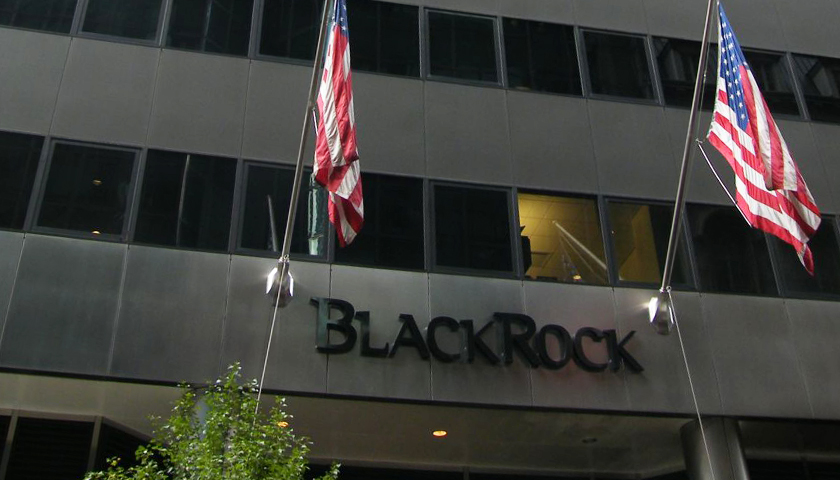by Jerry Bowyer
BlackRock has gone from being known as the largest asset manager in the world to being known as the investment company that pushes a social agenda on the companies it invests in. From cajoling corporate America into signing the manifesto of stakeholder capitalism, the Business Roundtable Statement on Corporate Responsibility, to putting anti-oil board members on the board of oil companies, BlackRock has developed a reputation, at least among conservatives, as a company that is imposing CEO Larry Fink’s social agenda on American capitalism.
In fact, the reputational issue is so prevalent that Fink spent much of the recent annual report rebutting it, arguing that what he is practicing is simply capitalism and that the imposition of climate change minimization measures and other ESG (Environmental, Social, and Governance) issues relevant to stakeholders is simply capitalism. The standard arguments here are that practicing ESG is not politics but rather risk management. Typically ESG proposals talk about reputational risk or the risk that at some point in the future governments will embrace the values expressed in ESG circles and impose them involuntarily on businesses. In such cases, for example, fossil fuel companies will be stuck with “stranded assets”, i.e. oil and gas wells rendered worthless by the coming age of enlightened energy regulation.
It’s no surprise that this type of proxy policy goes together with the ideology of stakeholder capitalism. Demoting the owners of companies down to the same level as other stakeholders such as employees, suppliers, the “community,” and even the planet gets justified by claiming that in the end, it’s all the same thing. What’s good for stakeholders supposedly is good for shareholders, although we don’t hear the contrary argument often, that what’s good for shareholders is good for society, at least not since it was articulated by Milton Friedman, a favorite whipping boy for stakeholderists.
But BlackRock is not just an asset manager whose funds invest in other companies – BlackRock is also a company with shareholders of its own. And in last week’s annual meeting, one of them tried to do to BlackRock what BlackRock has been doing to the rest of corporate America. He used his shares to place a proposal on the ballot to impose stakeholder ideology on the company. Predictably, BlackRock opposed the measure. I guess companies don’t like activists telling them what political positions to take.
The proponent took stakeholder capitalism to its next logical conclusion:
“RESOLVED, shareholders ask that, to the extent practicable, consistent with fiduciary duties, and otherwise legally and contractually permissible, the Company adopt stewardship practices designed to curtail corporate activities that externalize social and environmental costs that are likely to decrease the returns of portfolios that are diversified in accordance with portfolio theory, even if such curtailment could decrease returns at the externalizing company. “printmgr file (q4cdn.com)
The activist investors argue that when companies engage in actions that are alleged to impose various social costs, such as climate change arising from green-house gases emissions, that hurts society economically and therefore hurts overall stock market performance. The emitting company might profit from such activity but since its investors are, or at least should be, diversified, then they are, on balance, harmed. In more technical financial terms, focusing on “alpha”, individual stock performance, comes at the expense of “beta”, overall performance. The reasoning is substantially the same as stakeholder dogma, that companies should focus on social good and that this is good for investors.
And yet BlackRock’s board unanimously urged shareholders to reject the proposal. Claiming (accurately in my view) that “the proposal is not in the best interests of BlackRock and our shareholders. As an asset manager, BlackRock is a fiduciary with a duty to act in the best interests of its clients.” All true, but why does that not apply to pushing de-carbonization on hydro-carbon producing and using businesses?
The activist investor calls upon BlackRock to adopt policies which “curtail corporate activities that externalize social and environmental costs”. BlackRock’s board countered that “the proposal is asking BlackRock to take actions potentially at odds with some clients’ stated investment objectives and our fiduciary duties” because the activist wants policies “directly support[ing] the health of social and environmental systems.” Sounds like stakeholderism to me. Sounds like BlackRock doesn’t want to eat its own cooking.
When huge institutional money managers act in the role of activist investors and tell companies to turn Milton Friedman’s picture to the wall and shift towards shareholder primacy, that’s just good capitalist risk management. But when the shoe is on the other foot and an activist knocks on their door and asks the company to look at the macroeconomic effects of its own policies for the good of diversified shareholders, well that “would be inconsistent with our responsibility to our clients, and our legal duties, and create legal risks for BlackRock and our shareholders.”
Read it all for yourself here: printmgr file (q4cdn.com)
– – –
Jerry Bowyer is the President of Bowyer Research, an economic and financial research and consulting firm.
Photo “BlackRock” by Americasroof CC BY-SA 3.0.





